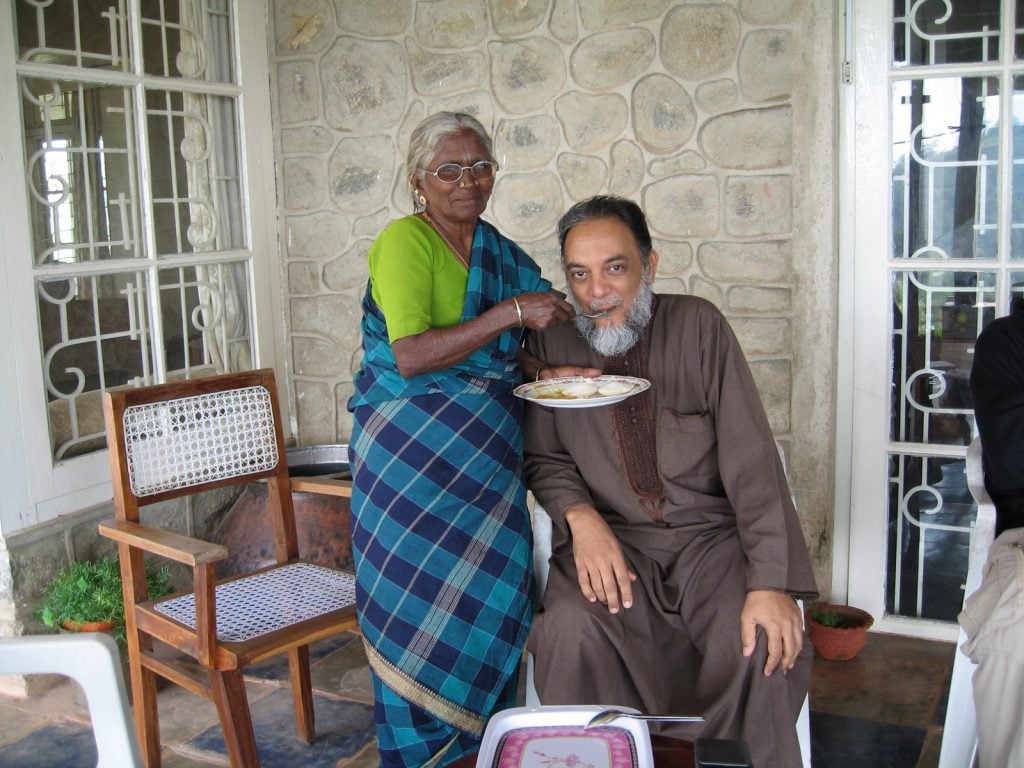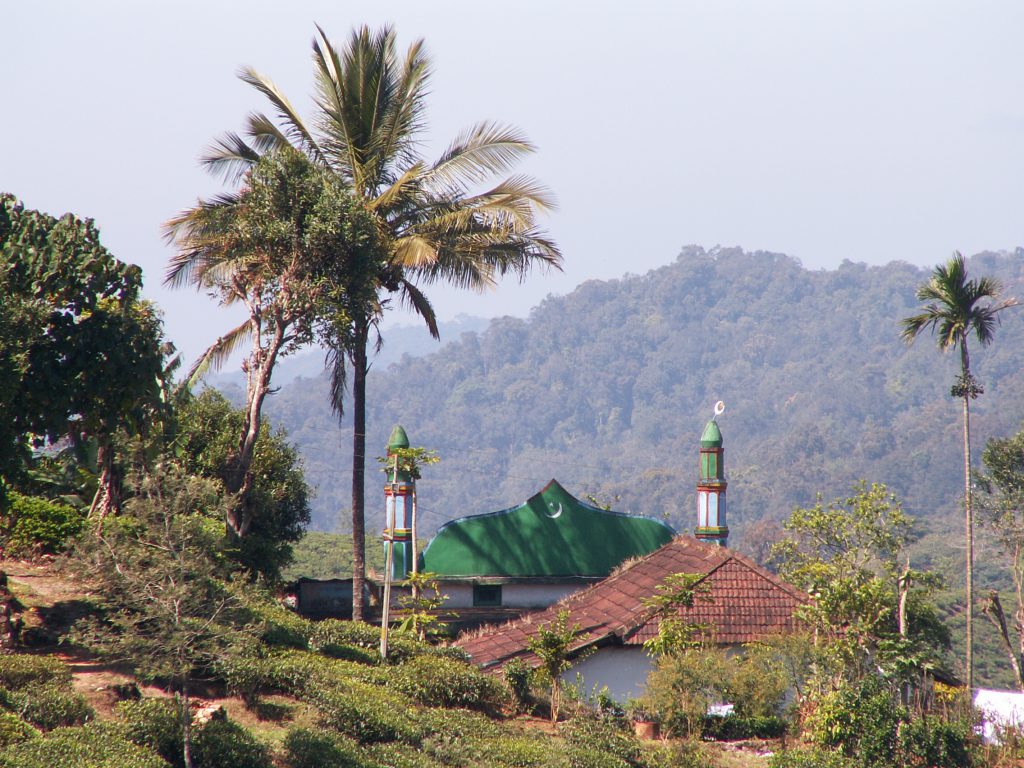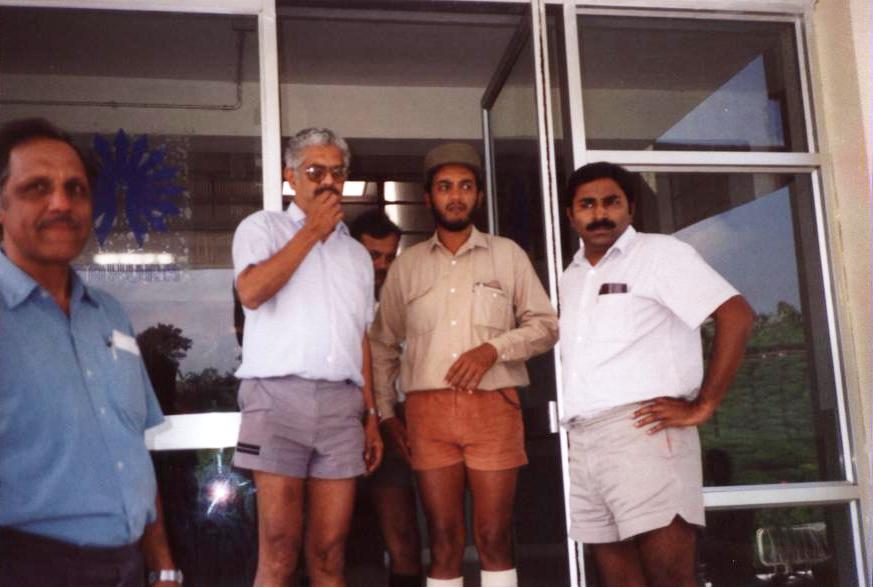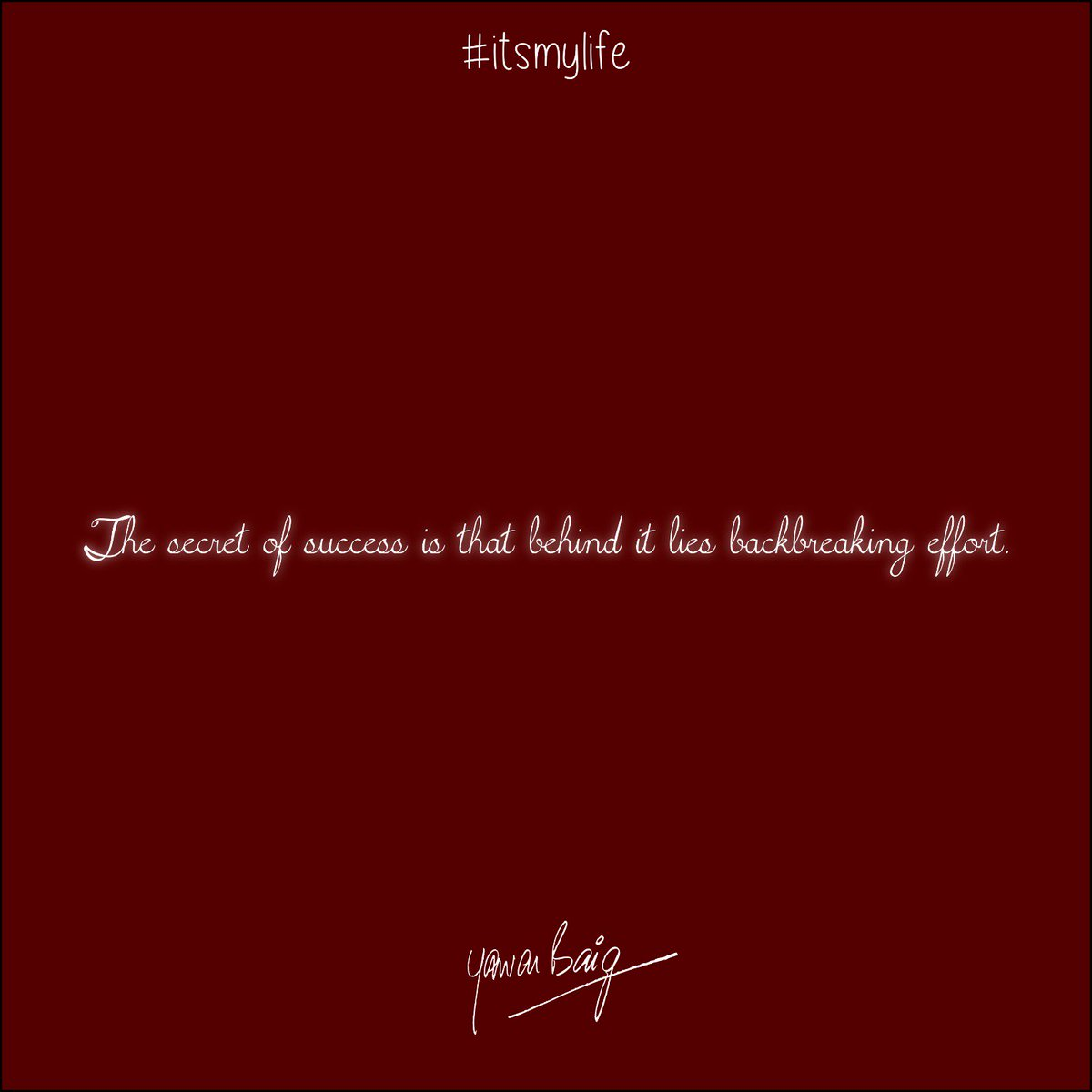
How to beat Goliath
Because size doesn’t matter
I have formulated 6 rules which I call David’s rules. These are for anyone facing the big one ...

The tea plantations of the Sub-continent are a unique environment, be that in South India, Assam or Sri Lanka because they represent a completely artificial man-made community. The areas where tea is grown were, until a hundred years ago, pristine rain forest. Then came the British, having discovered wild tea in Assam as well as with stolen tea seedlings from China, which broke the tea monopoly of that country. Workers were transported from the plains of Tamilnadu for South Indian and Sri Lankan (Ceylon) plantations and from Orissa and Bengal for the Assam gardens. In South India most if not almost all of them were Dalits. They were housed in colonies according to their native areas. They built temples and either one of them officiated as the priest, having learned the rituals in Eklavya tradition (unofficially from some kind priest who would teach him) or they hired a poor Brahmin, who because he was paid by them, didn’t prevent them from entering the temple. This was not the case (and to this day it is not the case) in their own homelands, where Dalits, though officially classified as Hindu, are not permitted inside Hindu temples. This resulted in an egalitarian tradition which continues to this day, where everyone participates in all festivals and religious functions. The estate manager especially, irrespective of his religion, is expected to officiate at all religious functions of all religions and is specifically invited as the Chief Guest. Generally, this merely means putting in an appearance and flagging off a temple procession or lighting a lamp to signify the beginning of a ceremony or some other symbolic gesture. But it is nevertheless important and taken very seriously.
There is a book called Red Tea, by Paul Harris Daniel, which is a novel but is based on fact. The author took sworn affidavits from those whose stories he told. This book was published by Higginbotham’s in 1969 and was later made into the Tamil film ‘Paradesi’. The book gives a good account of what life in the early plantations was like and what the real price of tea is, not in money but in lives and blood of animals and men. Not to speak of the tremendous damage to the rain forests of Northeast and South India and Sri Lanka (Ceylon in those days). But those were the days before there was any awareness about these things and after all we were a colony to be exploited for the benefit of the British Empire and so we were; thoroughly.
When I joined planting in 1983, this was all history but there were still old workers who had seen a lot of what I have written above. One of them was Kullan, who was in his 70’s when I met him in 1983. We would sit on my veranda in the night and he would tell me stories about the ‘old days’ (Palaya Gaalam). That is the benefit of learning the language (Tamil, which I didn’t know a word of until I joined planting) and of having a good relationship with your workers. It was in the course of one of those sessions that he told me in a very matter of fact tone that the bungalow in which I lived (where we were sitting right then) was the estate hospital in those days and in the monsoon when there was an epidemic of cholera, many bodies were simply thrown into the ravine that was a little way behind the bungalow. “That is why their ghosts are still wandering here, Dorai”, he said to me. I must say that none of them ever bothered me, though Kullan was not the only one who mentioned ghosts in that bungalow.

The Muslim workers in Murugalli Estate where I was posted decided to dismantle the temporary shed that they used as a masjid and build a small, but permanent concrete structure in its place. They had collected some money and the company also gave them a small grant. But when they did the math in the end, they discovered that they had no money for the centering sheets to cast the concrete roof, nor did they have money for the labor to cast the slab. They came to me for advice to resolve this issue. I spoke to Mr. Dakshinamurthy, the Mayura Factory, Site Engineer, and he readily agreed to loan them the centering sheets free of cost. He also loaned them the concrete mixer. All that remained was the labor. I suggested to them that we do a working Sunday and get all the Muslim men to help with the labor and the Muslim women to make some food.
“Why do you need to pay for labor to build a masjid when we are all here?” I asked them. They all agreed enthusiastically. So, the following Sunday that is what we did. What fun we had!!
The Muslim workers in Murugalli were all from the Mallapuram district of Kerala. The women made some wonderful Malabari Biryani and we started early in the morning after a large mug of highly sweetened Malabari tea. We set up a human chain from the mixer to the top; I was on the top. The men started a chant in Malayalam as they passed up the concrete containers and we started pouring the concrete. This is a job that needs to be done without stopping, so as the day advanced and we became tired, the work became progressively more difficult. But the spirit of the work, the fact that we were building a masjid, and the promise of the Malabari Biryani, which was making its presence felt as its aroma floated on the air as it cooked, kept us going. By late afternoon the final load was cast, and we came down. Then after washing up, we sat down to a meal that was more delicious than I remembered eating ever before. Was it the food? Was it the hunger? Was it the fact that we were eating it after a day well spent? I don’t know. All I know is that it was wonderful to eat.
There is a sad ending to this part of my story. Dakshinamurty suddenly died in a very bizarre accident. He was at home one weekend and was having his head oiled. The barber who did the oil massage for him twisted his head to crack his spine. This is a very common practice in India and is done all the time without any adverse result. However, in Dakshinamurty’s case the man accidentally snapped his spinal cord. He was instantly paralyzed from the neck down and two days later he passed away. Sadly, he could not see the completion of Mayura Factory, the project that he had started. D.R.S. Chary stayed with me till the project was completed and then returned to Chennai where he lived. A couple of years later, I heard that he also passed away. I mourn the passing of these good people with whom I shared some wonderful times.
When Mayura was finally built and was to be inaugurated, Mr. AMM Arunachalam sent priests to do a puja – Ganapathy Homam (Havan), which was to start at 2:00 am the next morning and would go on for several hours. To my astonishment, Mr. AVG Menon called me and said, “AMM wants you to officiate as the representative of the Murgappa family at the puja. If you don’t want to do it, then he asked me to find someone else.” I was astonished to say the least because I am Muslim and I had never imagined that I would be asked to officiate at a Hindu puja, that too one which was so important to the Murugappa family. Obviously, it was a great honor and highly unusual. I told AVG that I would not actually be worshiping if I participated but he said that was alright. I asked him what I needed to do. He said to me, “You need to go there at 2:00 am when it starts and sit there with the priests. They will recite the slokas and every once in a while, the head priest will give you some grains of rice, which you must throw on to the fire.” That seemed simple enough and so I, a Muslim, officiated at a Ganapathy Homam on behalf of the Murugappa family at the opening of the Mayura Fatory in the Anamallais. I would like to believe that the extraordinary success of the factory was a result of my participation in its inauguration. In today’s India I wonder what happened to that India which I lived in. Where did it all go?

Once the puja was complete, we got ready for the formal inauguration to which the entire Board of Directors was invited including the Chairman Mr. AMM Arunachalam. This was followed by a lunch at the Group Manager, Mr. AVG Menon’s bungalow in Sheikalmudi. The building of Mayura Factory was a truly historic occurrence because tea factories are not built every day. Most in the Anamallais were over eighty years old at the time Mayura was built and commissioned (1985). On top of that it was the largest and most modern factory in India with computer-controlled systems and all kinds of bells and whistles. Since I was the man on the spot, so to speak, I had to be in many places at once and managed to do it. Everything went off well. Lunch finished late and we returned home close to 5:00pm. I had been awake and working for 48 hours straight with perhaps a short nap on my feet. But the day had not ended yet for me. We, my newly wedded wife and I, had a formal dinner to attend in Mudis.
Among the customs of plantation life was that of ‘calling on’ the seniors of the district. When you came in new or got married and your wife came to the estates, you called on the seniors of the district to introduce yourself and her. You telephoned or sent a letter saying that you would like to call on them and asked when would be convenient. These were formal social meetings and you were treated with great dignity and grace. This ‘calling on’ was usually for tea unless it was somebody you knew already, in which case you would be invited to dinner.
We had just got married (March 1985) and I returned with my wife, post haste to the estate because Mayura Factory opening was due. Two days after our marriage we boarded the train for Coimbatore from where we drove up the Aliyar Ghat of forty hairpin bends. My wife was violently sick all the way up the Ghat. Being prone to motion sickness, the Ghat road was not doing her any good at all. I was very concerned because this Ghat road was a given if we lived in the Anamallais and with my wife being so sick on it, it didn’t seem to portend well for us. The prospect of a repeat performance every time we traveled was definitely not something to look forward to. But as it happened after a couple of trips my wife got over her motion sickness altogether. Maybe the Ghat road shocked it out of her system.
As was the custom of the plantations when anyone got married and returned with his wife, there was a round of parties to meet the couple. So also, in our case and since I was the Secretary of the Anamallai Club, I had more than my fair share of friends and so we had a party to go to every night. The parties were formal suit and tie affairs and the hostess would go to great lengths to cook special dishes in honor of the guests and at the end the couple would be given a gift. In a place where social relationships were very important, these parties were not simply for entertainment. They were rites of passage and thresholds of entry from bachelorhood to marriage, which gave you a higher level of status and respect. They also had a ‘snob value’ associated with who invited you and who didn’t. I didn’t bother with that at all, but then again, I was invited by everyone, so it didn’t matter. The parties were also a good way to introduce the new bride to a way of life that was foreign to her and helped her to make contacts with senior ladies and others more experienced in this lifestyle, which could be challenging for someone born and brought up in the city. Most people who go to tea gardens for a holiday in good weather don’t realize the difficulty of that environment for those who must live there all year round.

The estate workers also welcomed the Assistant Manager when he returned with his wife. In my case, the Candoora workers were the first. As our car rounded the bend off the Sholayar Dam and came towards ‘Black Bridge,’ we were stopped and requested to alight. We both came out of the car, glad for the chance to stretch our legs. The road was lined with girls who sang a welcome song and showered us with flower petals as we walked through this guard of honor. We were taken to a small pavilion which I realized had been made by tying the best sarees of the women to the poles and decorated with lots of flowers. Tea garden workers can be the most loving people in the world and if you are good to them, they appreciate it and reciprocate. I saw many examples of that in my decade long career. We were garlanded and sat at a table on the two grandest chairs that they could find. Then we were served tea with biscuits and sweets. It was then that a depressed fly decided to end its meaningless life in my wife’s tea cup. But my wife being the perfect lady that she is, merely fished out the fly and drank the tea without batting an eyelid. An amazing performance which saved us from a lot of embarrassment. Those poor workers had taken so much trouble to welcome us that it would have been very ungraceful to complain, even about the suicide of a fly.
Then speeches were made, and the women danced and sang another song in our honor in which we were mentioned repeatedly in sometimes a humorous way and sometimes with great respect. The amazing thing was that this song was made up then and there and they sang about various habits of mine, including singing while I rode my motorcycle. People observed you and remembered and mentioned what you did. All the more reason to ensure that whatever it was, remained good and honorable. At the end of this song and dance there were some speeches by the local union leaders and one supervisor and then I was asked to speak. It was permitted for the manager to speak in English and the speech would be translated. But I had learnt Tamil for occasions such as these and spoke it well, much to everyone’s delight. When I had finished and thanked them for all their trouble and expressed our gratitude for the honor that we had been granted, they gave my wife a gold ring as their gift as a mark of their love and honor for me. I was floored. These were poor people who had collected money for this, something which was not expected of them at all. What could I say? As I mentioned earlier, Managers and workers in the plantations form bonds that are more like family than anything else.
To return to the daily dinner parties in our honor, these daily night outings were so frequent that my wife could recognize a road only in the dark. The parties, enjoyable though they were and were a good way to meet friends who lived too far to visit frequently, could be very taxing as they tended to go on very late. I was expected to put in an appearance at the morning muster on the estate at 6:00 am no matter when we returned. The night of Mayura Factory inauguration (the day that started at 2:00 am), we had been invited to dinner at the home of our dear friends, Prema and Ricky Muthanna in Mudis. Ricky was the General Manager of BBTC and we were honored to be invited to their home. As it happened, there was no time even for a short snooze in the afternoon thanks to the inauguration and to top it all, my car was once again in hospital. I didn’t fancy the idea of going all the way to Mudis (about thirty km on serpentine estate roads, decorated with potholes) on my motorcycle. I asked AVG Menon to borrow his new car, an Ambassador, for the evening and he graciously agreed.
We set off at about 7:00 pm as the dinner was for 8:00 pm. I was exhausted as I had been awake for 48 hours, but we set off, my wife and I, on this long drive. We arrived at Prema and Ricky’s house to a very warm welcome. My wife and Prema became friends instantly and have remained friends all these years. Ricky and Prema’s home was a delight, very tastefully decorated and one of the iconic bungalows in the Anamallais. It was the only bungalow to my knowledge which had a central courtyard with a veranda all around it and so it had a garden inside and outside. Prema had called a lot of people in our honor and the house was full of our friends and some others who I knew by name but was meeting for the first time.
All plantation parties (except in my house) started with drinks, which the men consumed in large quantities while the women sipped soft drinks and discussed matters of great import. As I was not one for the spiritual experience, I would take my orange juice or fresh lime soda and chat with whoever was still on mother earth. But as many left for higher altitudes in proportion to the spirit inside them, I would usually take myself off into a corner and contemplate the world. That day I was so sleepy and tired that my eyes were self-shutting unable to withstand the weight of my eyelids, while the party was in full swing. I was clearly out of it. Prema saw me in that state and said to us, ‘Yawar looks like he is going to drop. Let me give you dinner so that you can eat and leave. I have no idea when these men will eat, and you look like you won’t last too long.’ I agreed wholeheartedly, and we ate, said our farewells quietly and left.
Even up to that point I had my faculties still intact. You had to be alert when driving in the Anamallais, both because of the road conditions as well as the possibility of coming upon a herd of elephants or gaur around a bend. That night was mercifully elephant free and we reached Lower Sheikalmudi Estate without incident. As I took the final turn on the road leading up to our bungalow (the ‘Tennis Court Bungalow’), I relaxed and that was my undoing. The next thing I knew, there was a crash and the car came to an abrupt halt. I was shocked back into awareness and realized that I had driven off the road. The left front wheel of the car was hanging off the side of the road in midair with the front fender resting against a tea bush, which was the reason we didn’t go all the way down into the ravine. The chassis was resting on the road bed. My wife and I were shocked. It was 2:00 am and there we were.
I realized that this was not a good situation because the car didn’t belong to me. It was Mr. Menon’s car and a new one to boot. It was therefore my responsibility to get out of this situation. It didn’t even occur to me that I could leave the car where it was until morning and then get assistance to take it out of its predicament. I had crashed it and it was up to me to get it out. And I had to do it right away; it was not even a matter to think about. As it was, the car was directly below a stairway that led up to our house. I got my wife to walk up to the house so that she would be safely home. Then I went in search of a tractor to pull the car out. I knew that the leaf transport tractors – Massey Ferguson – used to be parked near Mayura Factory, about two kilometers from where I was. Our roads had no street lights and it was a dark night. The tea fields were home to wild boar and other friendly species, not to mention several species of snakes, but none of them was my boss while AVG Menon was. So, I hiked off in search of a tractor. On the way I called my good friend, mechanic Thangavelu, because there was no way that I could pull the car out alone. He and his ever-present smile came out of his house as if he had been waiting for me. Both of us got to where the tractors were parked and selected the one we wanted.
None of the tractors had self-starters and used to be parked on an incline so that you could roll down and start the engine. And they had no lights; I never understood why. Working in starlight, I got into the driver’s seat, rolled down, and started the tractor. Now we needed a tow rope. Thangavelu recalled that the telephone company people had been working on a line passing through one of our fields and had left a coil of telephone wire there. So off we went, with Thangavelu standing on a plank behind me, holding the seat as I drove the tractor. We picked up the coil of wire and drove back to where the car was; hooked up the wire to the chassis at the back and pulled the car back on the road. When I examined the damage, I saw that the tea bush had taken the shock and except for a small side indicator light, nothing was broken. That was a big relief to put it mildly. Thangavelu and I, then took the tractor back to its parking spot and I drove home at 3:30 am. I still recall the first thing that AVG asked me when I told him that we’d had an accident in his new car. He said, “I hope you both are alright?” I told him that we were fine but that his new car had been inaugurated with a broken indicator light. He was amused and laughed it off and said, “That can be fixed. I am happy that nothing happened to you both.”
That is why we used to call him A Very Good Menon (AVG Menon).
Please log in to leave a comment
Loading comments...

I have formulated 6 rules which I call David’s rules. These are for anyone facing the big one ...

One of my friends who comes from ...
I have said this a million times, if I have said it once – the three crimes committed on society with society’s blessing are: Commerci...